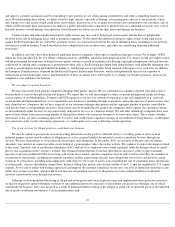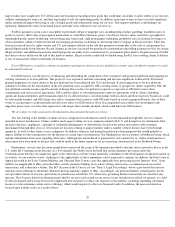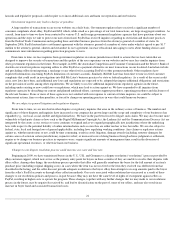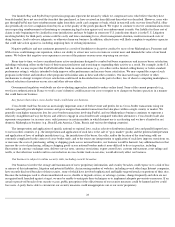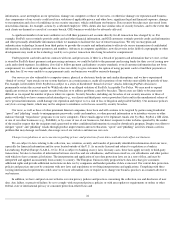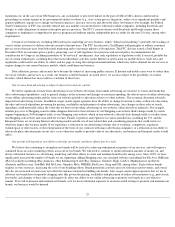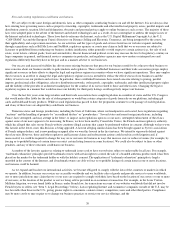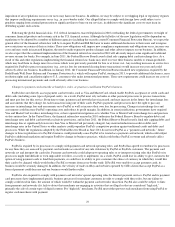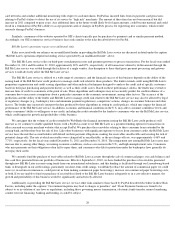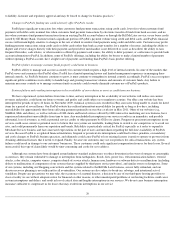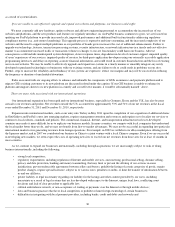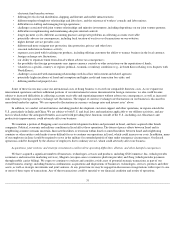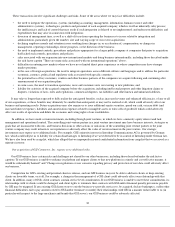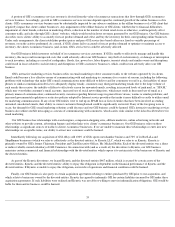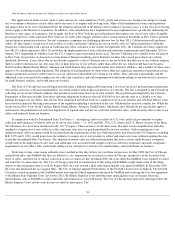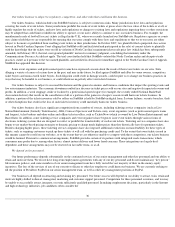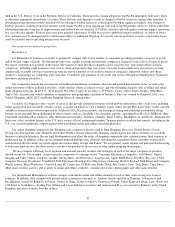eBay 2011 Annual Report Download - page 33
Download and view the complete annual report
Please find page 33 of the 2011 eBay annual report below. You can navigate through the pages in the report by either clicking on the pages listed below, or by using the keyword search tool below to find specific information within the annual report.
card networks and conduct additional monitoring with respect to such merchants. PayPal has incurred fines from its payment card processors
relating to PayPal's failure to detect the use of its service by “high risk” merchants. The amount of these fines has not been material, but did
increase in 2011 compared to prior years. Any additional fines in the future would likely be for larger amounts, could become material and could
result in a termination of PayPal's ability to accept payment cards or changes in PayPal's process for registering new customers, which would
seriously damage PayPal's business.
Similarly, consumers of the websites operated by GSI's clients typically pay for purchases by payment card or similar payment method.
Accordingly, our GSI ecommerce services business faces risks similar to the risks described above for PayPal.
Bill Me Later's operations expose us to additional risks.
Risks associated with our reliance on an unaffiliated lender in providing the Bill Me Later service are discussed in detail under the caption
“Bill Me Later's operations depend on lending services provided by an unaffiliated lender” above.
The Bill Me Later service relies on third-
party merchant processors and payment gateways to process transactions. For the fiscal years ended
December 31, 2011 and December 31, 2010, approximately 69% and 67%, respectively, of all transaction volume by dollar amount through the
Bill Me Later service was settled through the facilities of a single vendor. Any disruption to these third party payment processing and gateway
services would adversely affect the Bill Me Later service.
The Bill Me Later service is offered to a wide range of consumers, and the financial success of this business depends on the ability of the
issuing bank of the Bill Me Later credit products to manage credit risk related to those products. The lender extends credit using Bill Me Later's
proprietary segmentation and credit scoring algorithms and other analytical techniques designed to analyze the credit risk of specific customers
based on their past purchasing and payment history as well as their credit scores. Based on these performance criteria, the lender may extend or
increase lines of credit to consumers at the point of sale. These algorithms and techniques may not accurately predict the creditworthiness of a
consumer due to inaccurate assumptions about a particular consumer or the economic environment, among other factors. The accuracy of the
predictions and the ability of the lender and Bill Me Later to manage credit risk related to the Bill Me Later service may also be affected by legal
or regulatory changes (e.g., bankruptcy laws and minimum payment regulations), competitors' actions, changes in consumer behavior and other
factors. The lender may incorrectly interpret the data produced by these algorithms in setting its credit policies, which may impact the financial
performance of the Bill Me Later service. In addition, economic and financial conditions in the U.S. may affect consumer confidence levels and
reduce consumers' ability or willingness to use credit, including the credit extended by the lender to consumers who use the Bill Me Later service,
which could impair the growth and profitability of this business.
We anticipate that the volume of credit extended by WebBank (the financial institution issuing the Bill Me Later credit products) will
increase as we continue to enable qualified buyers with a PayPal account to use Bill Me Later as a payment funding option for transactions on
eBay.com and on certain merchant websites that accept PayPal. We purchase the receivables relating to these consumer loans extended by the
issuing bank, and therefore bear the risk of loss. Like other businesses with significant exposure to losses from consumer credit, the Bill Me Later
service faces the risk that account holders will default on their payment obligations, making the receivables uncollectible and creating the risk of
potential charge-offs. The rate at which receivables were charged off as uncollectible, or the net charge-off rate, was approximately 4.46% and
7.71%, respectively, for the fiscal years ended December 31, 2011 and December 31, 2010. The nonpayment rate among Bill Me Later users may
increase due to, among other things, worsening economic conditions, such as a recession in the U.S., and high unemployment rates. Consumers
who miss payments on their obligations often fail to repay them, and consumers who file for protection under the bankruptcy laws generally do
not repay their credit.
We currently fund the purchase of receivables related to Bill Me Later accounts through the sale of commercial paper, our cash balances and
free cash flow generated from our portfolio of businesses. Effective September 1, 2010, we have funded the purchase of receivables generated
through new Bill Me Later accounts using funds from our international subsidiaries, and this funding is facilitated through our Luxembourg-based
bank. A downgrade in our credit ratings, particularly our short-term credit ratings, would likely reduce the amount of commercial paper we could
issue (or, in certain circumstances, could prevent us from making commercial paper borrowings), increase our commercial paper borrowing costs,
or both. If we are unable to fund our purchase of receivables related to the Bill Me Later business adequately or in a cost-effective manner, the
growth and profitability of this business would be significantly and adversely affected.
Additionally, in providing the Bill Me Later service, we face other risks similar to those faced by PayPal described elsewhere in these Risk
Factors, including under the captions “Government inquiries may lead to charges or penalties” and “If our Payments business is found to be
subject to or in violation of any laws or regulations, including those governing money transmission, electronic funds transfer, money laundering,
counter-terrorist financing, banking and lending, it could be subject
28



